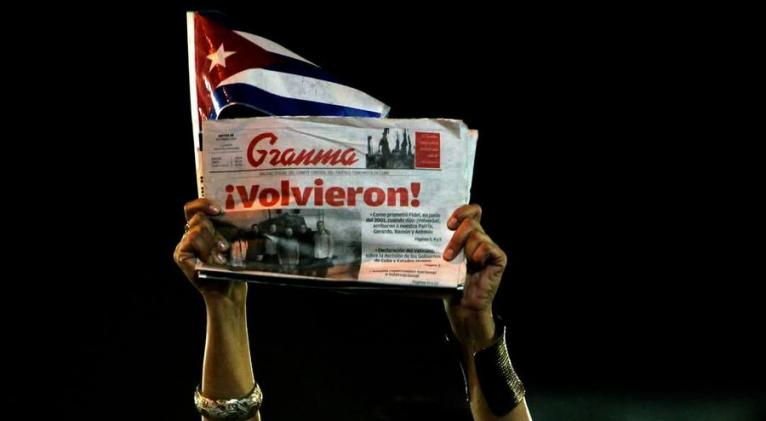Cuba-US, a decade after the return of the Five
especiales

On December 17, 2014, Presidents Barack Obama and Raúl Castro announced that the United States and Cuba would resume diplomatic ties, but today, a decade later, far from progress, there is regression.
“We have agreed to reestablish diplomatic relations,” said the Cuban president, while his counterpart said in the simultaneous speech that he had instructed his Secretary of State, John Kerry, “to reestablish diplomatic relations that have been interrupted (by unilateral decision of Washington) since January 1961.”
That day, the prediction made by the historic leader of the Cuban Revolution, Fidel Castro, was fulfilled when he said, “The Five will return,” in reference to the Cuban anti-terrorists who served lengthy and unjust sentences in US federal prisons.
On December 17, Cuba welcomed Gerardo Hernández, Ramón Labañino and Antonio Guerrero, who were released and returned to their homeland, where their other two comrades in arms, Fernando González and René González, had come already.
What perhaps not a few saw with hope in terms of a possible path without tensions and hostility was just a momentary respite that was reversed immediately by Republican Donald Trump when he assumed the presidency of the United States in January 2017.
The Republican magnate had already anticipated it during his election campaign in 2016: if he reached the White House, he would eliminate the “concessions” made by Obama (2009-2017) to Cuba.
This is how he reduced visits by US citizens to Cuba, banned cruises, flights, educational trips, and in February 2017, the then new administration accused the Caribbean island of alleged acoustic attacks on its diplomats in Havana without evidence.
The pretext allowed it to adopt up to 243 subsequent coercive measures that reinforced the economic, commercial and financial blockade aimed at suffocating the Cuban people for more than six decades.
In his speech on December 17, Raúl Castro warned that the main obstacle in bilateral relations between Cuba and the United States was the blockade, which Obama applied with all his might, Trump redoubled, and Joe Biden followed to the letter.
Recently, Secretary of State Antony Blinken assured that he did not anticipate any change in Washington’s policy on Cuba before President Biden concludes his term.
“I do not anticipate any change in our policy towards Cuba by this Administration,” the senior official stated during an appearance before a Congressional committee.
He repeated the same when asked whether the Biden administration would be considering the eventual removal of Cuba from the State Sponsors of Terrorism (SSOT) list. “As I said, I do not anticipate any change,” he stressed.
Indeed, on December 12, an annual report from the State Department maintained Washington’s view that Cuba sponsors terrorism, an arbitrary designation applied for the first time in 1982 during the government of Ronald Reagan until 2015 when Obama eliminated it.
However, in January 2021, a few days before the end of his four-year term, Trump again included Cuba on that list, which Biden will apparently leave intact.
During his election campaign, the Democrat candidate assured that he would reverse Trump’s maximum pressure policy; however, less than a month after leaving the White House, his policy on Cuba remained connected and in line with that of his Republican predecessor, who, in addition, will return to the residence on Pennsylvania Avenue on January 20.














Add new comment